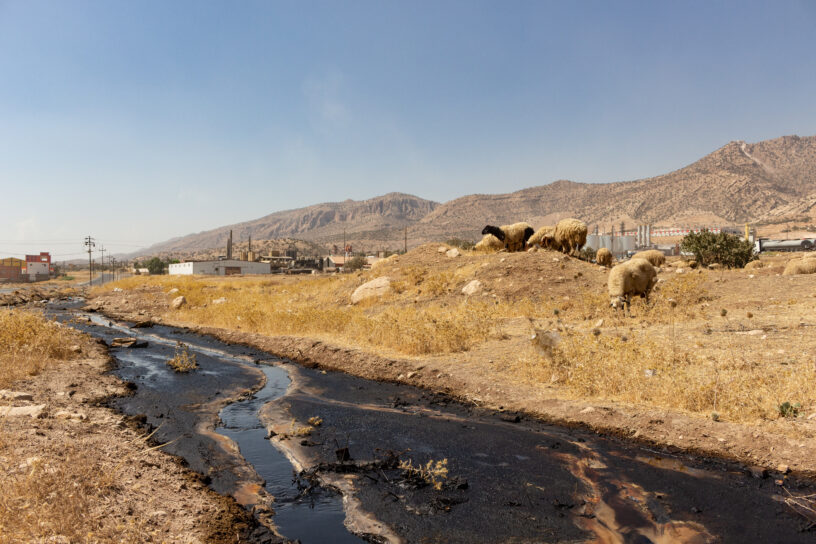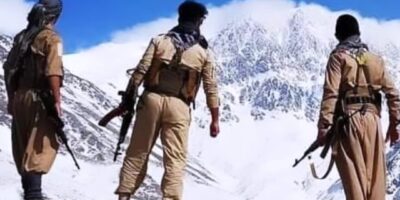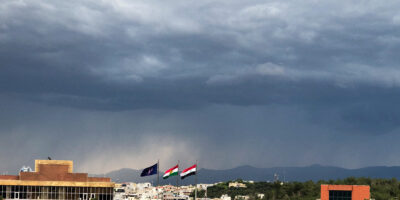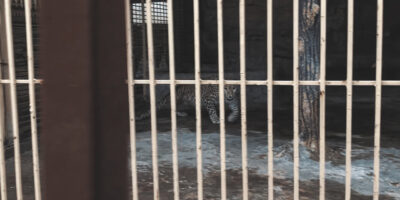KASHE, Kurdistan Region – Alham Ramadan was thrilled when her baby Leenas opened her mouth and uttered the word mama for the first time. She showered her nine-month-old girl with hugs and kisses, knowing that a life filled with a mother’s love was the only promise she could give her daughter. They live surrounded by the smokestacks of industry that cast a shadow over the family’s future.
While her husband went to work at a factory a short walk away from the village, Ramadan looked after their children – Leenas and her older daughter Ainas.
One day, she noticed that Leenas was very pale, the colour drained from her face. The worried parents rushed her to the local health centre, which sent them on to a children’s hospital in Duhok, which did a series of blood and spinal fluid tests before sending the family on again to a hospital in Erbil. There a room was readied for the little girl, and doctors finally gave Ramadan the diagnosis. Her baby had cancer – acute lymphoblastic leukaemia.
Doctors began a course of treatment and Ramadan watched her daughter get weaker every day until she passed away about a month later. “I was at her bedside the day she died,” Ramadan said, her head bowed with the weight of the memory.
While Leenas’ family mourned her brief life, her grandfather Issa Omar looked at the nearby factories that have multiplied in number over the past 10 years and blamed them for her death. As Kurdistan Region’s industrial sector has developed, cancer rates have increased and experts say the two are likely linked.
The family lives in Kashe, a village of a few dozen homes nestled at the base of the Zagros Mountains northwest of Duhok city. Hanging in the air is the acrid aroma of an animal carcass ripening in the summer heat, tinged with burnt oil. The smell comes from factories that lie just a stone’s throw away. They include oil refineries, a tannery, metal works. When the stench and the smoke become unbearable, villagers shut their windows and bury their faces in their pillows, but trying to escape is futile.
Life in Kashe village is being killed off by pollution of the air, water, and soil, and government failure to exert control over the industrial sector that spews toxic waste and profits from corruption. This same scene plays everywhere industry has developed in the Kurdistan Region, lining the roads that stretch southwest out of Erbil and along Sulaimani’s Tanjero River.
The people who live near these industrial zones say they have no control over the health of their environment and that they have been abandoned by their government, too poor to matter.
Ramadan, 34, wears a broad, friendly smile as she sits on a thin mat in the front room of her small home. Her eldest, eight-year-old Ainas, leans across her mother’s lap, watching everyone’s faces intently to follow the conversation. Ramadan’s youngest, five-year-old Du’a, lies on her back beside her mother, feet in the air as she plays on a mobile phone.
Ramadan moved to Kashe a decade ago when she married a man from this village. Her husband was tragically murdered just two years after Leenas died. As a single mother, she is dependent on her in-laws, and while she would like to move her daughters away from the factories to somewhere healthier for them to grow up, it is not a decision she can make alone. Leaning across her girls, she reaches out with her empty hands. “I don’t know where to go without my husband. It’s difficult for me,” she said. “When I’m with my mother-in-law, father-in-law and brothers-in-law, I feel I have someone by my side. Where should I go?”
The Kashe industrial zone occupies about five and a half square kilometres. The number of industries is small, but they have an outsized impact on the environment because they were built “without any planning,” said Mohammed Sedqi, head of the soil and water sciences department at the University of Duhok’s agricultural college. In the early 2000’s, the provincial government approved a plan to develop Kashe as an industrial zone. It was, at the time, distant from large population centres, but no plan was put into place to manage waste, nor were factors like wind direction and groundwater considered when the site was being developed, Sedqi explained.
Channels of wastewater flow out of the factories and meander through the gentle landscape, forming black pools on the edge of farmers’ fields. Shepherd boys graze their flocks beside the streams. One shepherd lost three dozen sheep that drowned in a pool of industrial waste and villagers say they have to be careful where they walk, especially at night when one misstep may send them to a toxic grave. Sedqi is worried that the surface pollution has seeped into the soil and groundwater where it has been accumulating for years. When it rains, he fears some of the pollutants get washed downhill and into the Mosul reservoir. And when the wind picks up, the stench of the factories drifts over Duhok city.
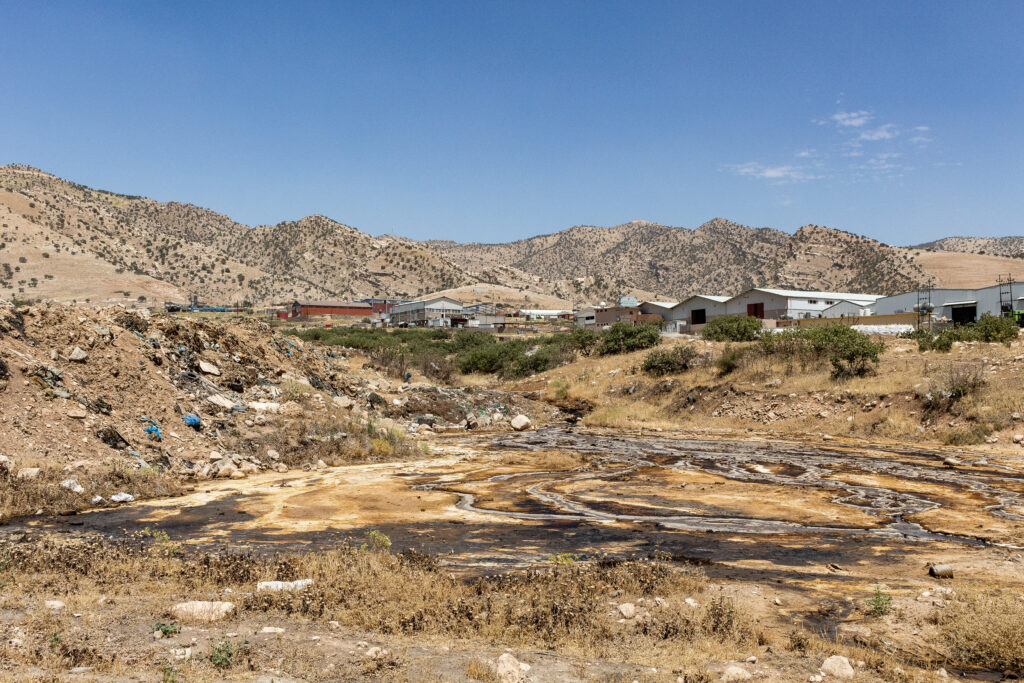
Further south, in Sulaimani province, the situation is depressingly similar. Industrial and municipal waste are dumped directly into the Tanjero River. Farms used to line the river, but now they are being squeezed out by factories. A report published this summer by Waterkeepers Iraq documented 245 threats to the vitality of the 120-kilometre-long Tanjero. Over half of the threats were sources of pollution, including 35 sites of industrial waste.
Numerous studies have found heavy metals like iron, zinc, aluminium, cadmium, arsenic, and more at levels multiple times above what is safe in the environment around these industrial zones. These heavy metals can do devastating damage to the body, including causing degenerative diseases and cancer.
When I visited both Kashe and Tanjero, I brought Flow – a portable air quality tracker that measures pollutants and uses World Health Organisation guidelines to give an air quality index (AQI). In both places the AQI was very high, hitting 125 in Kashe village and spiking to 131 near Tanjero River. At these levels, everyone, even those who are exposed to this polluted air only fleetingly, is at risk of negative health effects, and long-term exposure is a serious health risk. These levels were measured during the day, but the people who live there said the pollution is always worse at night when factories remove the filters from their smokestacks to save money without getting caught breaking the law.
This pollution is deadly. “More than one death in seven worldwide is the consequence of environmental pollution,” concluded the Lancet Planetary Health report published in May. The fastest growing causes of these deaths – the toxic chemical pollution of air, soil and water, as well as other kinds of air pollution – come from industrialisation and urbanisation. Most of the victims are the world’s poor. In low- and middle-income countries, “environmental pollution is the single largest cause of disease and death,” according to the Lancet report. And in higher-income countries, the poorest areas suffer the most due to pollution, as found by recent studies out of the United States and the United Kingdom.
In the Kurdistan Region, villagers in polluted areas say many within their families and neighbours suffer from ill health, mainly breathing problems and cancer, but data making the link between pollution and health is lacking.
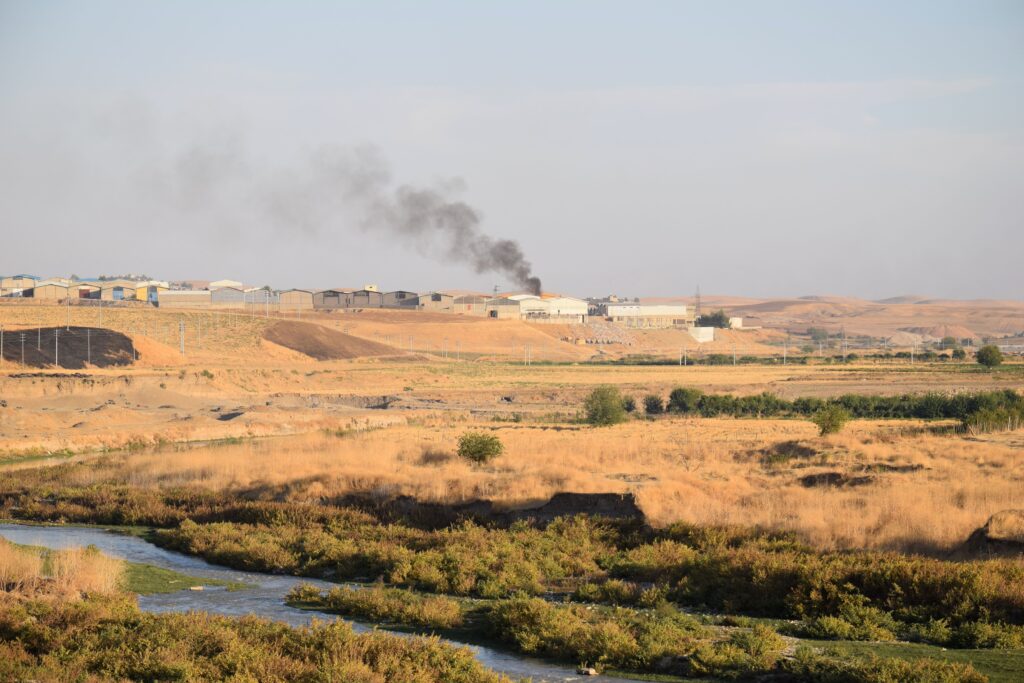
Dr. Najmaddin Khoshnaw began studying medicine at the end of the 1990s. At that time it was very rare, he said, to have a patient with cancer. That is no longer the case. In 2016, he reviewed data from Sulaimani’s Hiwa cancer hospital where he works and found a 62 percent increase in the number of cancer patients over an eight year period, from 2006 to 2014, a stretch of years that also saw rapid expansion of industry. He is now doing a review of data from the next eight years, up to 2022, and expects to see the rate is still increasing. In Duhok and Erbil governorates between 2013 and 2019, cancer rates more than doubled, a survey of government health data found.
Pinpointing the cause, however, is not straightforward. “We cannot prove what was the exact cause behind the increase in cancer,” Khoshnaw said, explaining that there are several potential factors including population growth, changes in diet, and increased use of plastics, as well as pollution. “All the doctors in the city and all of the government know that there is environmental pollution, but no one can prove [it], no one did a study,” he said.
Even though there are gaps in Kurdistan’s health data, scientists have been documenting the dangerous levels of pollution around these industrial zones for years and the risk of pollution to public health is clear. So why are the factories allowed to continue polluting?
Dr. Rezan Omer Rashid teaches ecology and pollution at the University of Sulaimani. When she started doing her Masters degree in 1993, she repeatedly had to explain what her chosen field was. “What is the environment?” she was asked many times. After obtaining her PhD while raising two children, she was the first biologist on staff at the University of Sulaimani, and today biology is a large department where Rashid supervises graduate students who have followed in her footsteps and are documenting pollution across the Kurdistan Region.
Understanding of the importance of the environment has been cemented in the academic world, but not yet in the halls of government, according to Rashid. “We are academics doing science, but we are not decision-makers,” she said, noting that those who do make the decisions are rarely interested in her and her students’ work. “It’s a problem here in Kurdistan. We don’t have a suitable man in the suitable place.”
The people who live under the industrial cloud say the reason for the government’s inaction is clear – corruption. They say the government serves the wealthy, influential business owners and not the poor villagers who are victims of a system that sets economic development as its priority.
“The poor have repeatedly demanded that the factories be closed, but the corrupt officials do not let that happen. It is fine for them that three people live while millions of poor people die,” said Leenas’ grandfather Omar.
Last year, the Kashe zone was temporarily shut down as a debate among government officials in Duhok province pitted economic development against the environment. Police set up checkpoints on the road leading into the site to prevent access, but the blockade was lifted after just one month because it threw 500 people out of work. Rising costs of electricity and cooking and heating oil, perennial concerns for most people in Kurdistan, were also blamed on the shut down.
Officials have also floated the idea of relocating the industries to a more remote site, but putting any plan into action is a challenge because of “connections,” said Omar Salah Smo, assistant to the mayor of Sumel, a town just south of Kashe. Kashe is “the dirtiest place in the world” and most of the families who live in the area would like to sell up and move, he said, but he declined to answer questions about why the government is so weak in the face of industry.
The Kurdistan Parliament passed an environmental protection law in 2008, several years after industrialization had begun in earnest. Under the law, industries must carry out an environmental impact assessment before they begin construction and polluting the environment is a crime, but, as is frequently the case in the Kurdistan Region, implementation of the law is a problem.
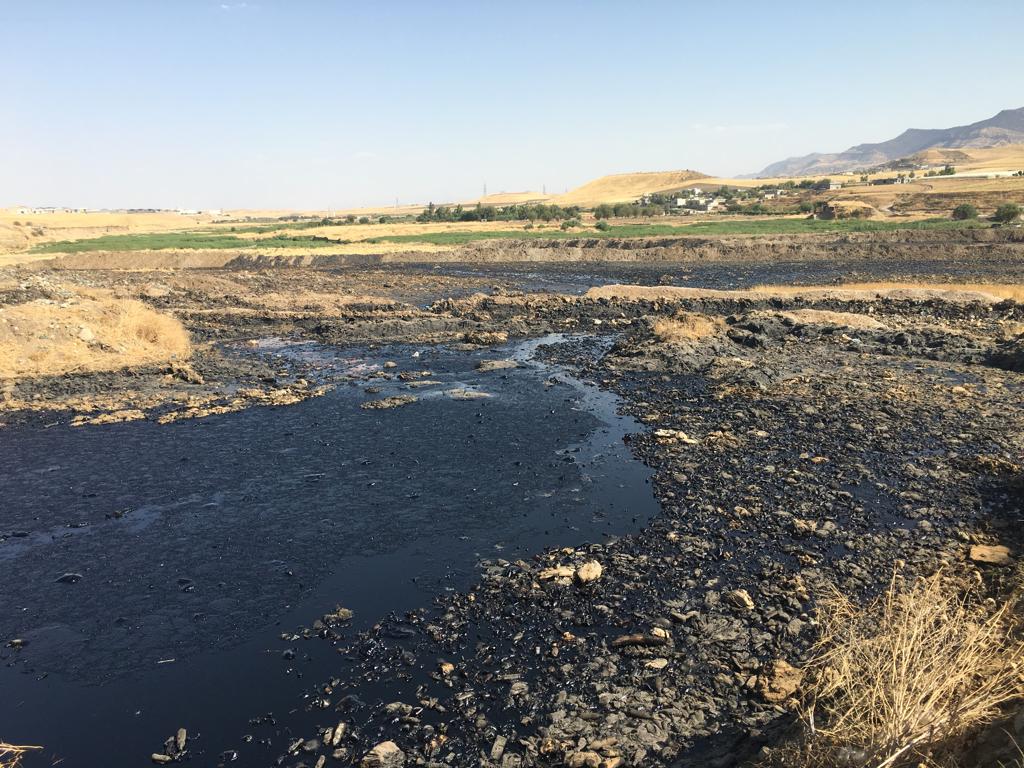
Enforcing environmental regulations and keeping tabs on industry is part of the job of the Board of Environmental Protection and Improvement, which is hampered by a lack of resources. Board monitors have the authority to visit all industries and factories and can issue fines for any violations found. They can also force factories to install or upgrade equipment to decrease their pollution. The tannery in Kashe, which researchers found was dumping arsenic into the environment, was forced to close over the summer by the environment board and ordered to install measures to treat its wastewater.
Money from fines, up to 10 million dinars, theoretically should go back into the environment board’s budget, “but we don’t have the authority to spend it for environmental issues, that’s the main issue,” said Diar Sheikh Garib, head of the Sulaimani branch of the environment board. For five years, his office has tried to access these funds, but it was impossible with the government in an economic crisis, caused in part by tumbling oil prices and budget disputes with Baghdad, and unable to meet its own payroll.
Garib acknowledged that when his monitoring teams are not watching, some factory owners do turn off their filters or dump their waste illegally.
Finances are not the only barrier to enforcing environmental rules and regulations. There is a fundamental deficiency in rule of law in the Kurdistan Region, according to the man whose job it is to combat corruption, the head of the Integrity Commission, Ahmad Anwar. For eight years from his unassuming office in view of Erbil’s ancient citadel, lawyer Anwar has been investigating cases brought to his attention mainly through tips from the public and media reports.
He believes corruption stems from lack of good administration and good management. The Kurdistan Regional Government has its roots in freedom fighters who battled the Iraqi state from mountain bases. After gaining some autonomy under the internationally-imposed no-fly-zone, the Kurdistan Parliament was established in 1992. The fighters came down from the mountains and entered the halls of government, but they came without experience in running an administration or the principles of good governance. In this setting, corruption was able to flourish and become embedded in the nascent institutions and systems, while principles of accountability and informed decision-making were pushed to the sidelines.
Anwar has seen periods of improvement, mainly at times when the government was not distracted by crises of finance, relations with Baghdad, or the war on terrorism. The current cabinet has taken steps the results of which Anwar expects will be evident in about three years’ time, but he says there are areas where the government must do better. The government must earn the trust of the people by taking action and forcing factory owners to clean up their pollution. It must also implement existing laws. “If we have good governance, we can solve other problems. Of course, as you know, one of the pillars of good governance is the rule of law,” he said.
Without the rule of law, industry owners can buy or coerce their way around the system, as husband and wife Abdullah Audel and Amina Abdullah discovered. The couple run a convenience store on the Sulaimani-Qaradagh road, 400 metres from Tanjero River and surrounded by factories. They moved here from Halabja 20 years ago, searching for work and a good place to raise their young family. At that time, life was good in the Tanjero area – it was clean and there were many farms growing rice, okra, tomatoes.
Not long after they moved, factory after factory was constructed and their life was poisoned. Audel bought a plot of land where he planned to grow a garden. That land is useless now. It is too contaminated to grow vegetables and no one wants to buy it. Their well used to run clear and fresh, but now “oil and gas are mixed with it and come up with the water,” he said. At night, when the pollution is at the highest level, they cannot open the windows in their home and their eyes tear up when they go outside. Two of their neighbours have died of cancer. Many times, Audel said, their neighbours staged protests and brought petitions to various officials – the mukhtar, the environment board, the police. All to no avail.
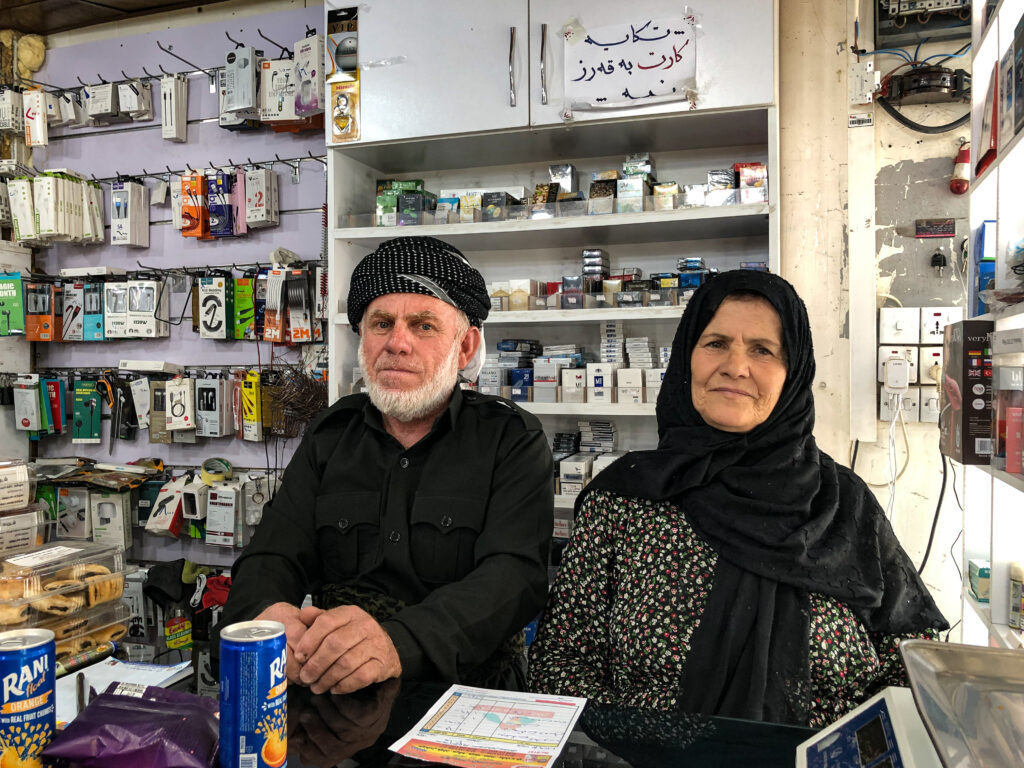
Several years ago, Audel tried unsuccessfully to take one of the oil refineries that was dumping waste into the river to court. “I went to the police, the environmental services and the court, and they all came and said yes, this is very harmful,” he said. But the case was transferred to another court in order, he believes, to be buried.
“If you have money…,” said Audel with a shrug. He does not expect the situation to improve any time soon, saying, “I don’t think there will be hope as long as this government exists.”
The current cabinet says it has heard the peoples’ concerns and is tackling corruption. “According to opinion polls, fighting corruption is a top priority for our citizens. Consequently, the government will do all it can to eradicate this problem,” reads the government’s website.
But even within the ruling Kurdistan Democratic Party (KDP), there are doubts about the government’s ability to root out entrenched corruption. “I do not think that the leadership is capable of completely eliminating this issue, but at least its sources are drying up and the space for corruption to fester is narrowing,” Kifah Mahmood, advisor to KDP leader Masoud Barzani, said in an interview with the Washington Institute earlier this year. He acknowledged that corruption was one of the main factors behind “all the negative repercussions that happened to the Kurdistan Region.”
These negative repercussions follow a very clear path: because of endemic corruption and lack of rule of law, industrial pollution is permitted to continue with little abatement. This has directly damaged the environment and public health. In the span of just a few years, families can no longer breathe the air in their homes, they cannot drink the water from their wells, they are mourning the deaths of their loved ones. And they feel powerless within a broken system where they have no route of communication with the government.
A bumpy dirt lane behind Audel’s shop takes you to Gopita village. The handful of houses sit on a hill overlooking the Tanjero River valley and Sulaimani city. Kamaran Talib, 46, was born here and says the area has completely changed in the past 15 years. The village’s view is now obscured by a blanket of haze and they no longer have clean water.
In mid-August, construction began on a new factory close by with an access road that passes just metres from Gopita. Worried that the new factory would contribute to the pollution and make life even more unbearable, villagers went to the authorities to ask for information about what the new industry was and why a factory was being built in a residential area. The people wanted a say in what was happening on their doorstep, but the authorities did not want to listen. The villagers were dismissed and told not to raise their concerns. “The government doesn’t even allow us to protest,” said Talib.

